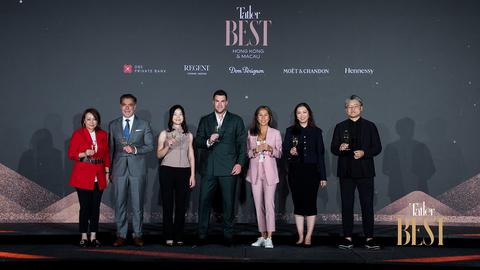Analyses & Studies • Sectors & markets • Foresight • Publications
HongKongEcho: Profiling Hong Kong's famed film producer Nansun Shi
Making great films is one thing. Turning a profit is another. Few have balanced these elements as masterfully as film producer Nansun Shi in a career spanning almost four decades.
Nansun Shi glides out from her surprisingly modest office to greet us; bold, eloquent, striking.
A handful of film posters adorn the walls. The quiet ripple of keyboard clatter punctuates an otherwise silent workspace in the residential neighbourhood of Kowloon Tong. There are few hints that we’ve stumbled into the heart of Hong Kong’s cultural fabric.
After all, Nansun’s 30-plus year career as a producer in Hong Kong’s film industry makes her one of its most recognisable stalwarts. Hits such as Infernal Affairs (2002) (later remade by Hollywood legend Martin Scorsese as The Departed in 2006), A Better Tomorrow (1986), Once Upon a Time in China (1991) and Flying Swords of Dragon Gate (2011) stand out in her impressive list of credits.
As co-founder of production company Film Workshop, she’s also an astute business owner whose longevity may only appear as a footnote to a particularly glittering profile. But it’s that business acumen which has set her apart from her peers.
Early days
Educated by nuns in the southern English county of Sussex – her accent remains gloriously British – Nansun’s path to the world of cinema is an unlikely one.
“When I was growing up, particularly coming from an Asian background, the expectation from your parents is that you would study to become a doctor, lawyer or engineer. That was never what I wanted,” she says.
Nonetheless, she went on to earn a degree in statistics and computer science at the Polytechnic of North London. “I was very busy at university, but not necessarily with the studying,” she says with a smirk. A boisterous schedule of student-run extracurricular activities fed her appetite for culture with her keen entrepreneurial eye beginning to emerge.
Lamenting the dilapidated state of the only cinema in her university neighbourhood’s Chinatown at the time, she bargained with its owner to rent her a handful of Chinese films that were otherwise gathering dust. He accepted and Nansun put on her own film screening at the university cinema, selling tickets to culture-hungry Chinese students. “It was a roaring success,” she says. “Looking back, this organisational experience set the foundations for my future.”
Finding her place
Returning to Hong Kong in 1975, she quickly set about leaving computer science behind. Through friends of friends, a little luck and a clear talent for cultural entrepreneurship, she ended up working part-time at Television Broadcast Limited before a three-year stint at Rediffusion Television Ltd.
Through the late 70s-early 80s, the city was experiencing its own Nouvelle Vague movement characterised by a bubbling sense of creativity, excitement and expression with first-time directors – many of them her friends or colleagues – popping up with feature-length films.
“People were asking me: Why don’t you become a director? Because everyone wants to be a director, right?” In typically modest fashion, she concluded at the time that her talent for direction was limited.
So she set her hand to the more business-orientated profession of production. “Lots of directors – especially in those days – were solely focused on the artistic side of things. Most of them were not so good at important organisational aspects like managing money and hiring staff. This is where I knew I could help.”
She began producing for Cinema City Studios in 1981, the company responsible for a swathe of slick comedy blockbusters. By 1984, she and then-husband Tsui Hark, an iconic and prolific director, had begun Film Workshop. Today Tsui remains her business partner despite their separation. “We just see each other less,” she jokes.
Cinema City Studios is long extinct, like many others from Hong Kong’s boom period, while Film Workshop persisted through the nadir of the late 90s when the industry struggled for funding and creative direction. “We’ve survived and set ourselves apart because we’ve been able to start a number of thematic trends and also build successful franchise films which produce offshoots and sequels,” she says.
Balancing act
Turning a director’s creative vision into a profitable endeavour means she’s acutely aware of the balance between artistic expression and commercial viability. “We make entertaining commercial films. But, crucially, we always have a social message or a strong element of artistic merit – both of which mean our films are present at festivals worldwide and this allows us to have global reach.”
Reconciling those two often-contradictory elements requires a certain amount of clarity and foresight. “You need to be honest with yourself and, importantly, with your investors. Are you setting out to make an artistic film which you may lose money on? If so, then your investor needs to know.”
Throughout the years, she doesn’t feel as though certain expectations have been placed on her as a female producer and she’s quick to remark that generalisations should be taken with a pinch of salt.
“People often say women tend to be more finicky in their work – but I’ve seen plenty of male directors who are like that. You could also say that women make good producers because they tend to be more patient and sympathetic – both important traits. But again, that’s only generally. Some are very impatient of course.”
For the woman who’s been awarded Officier de I’Ordre des Arts et des Lettres from the French Government and the Raimondo Rezzonico Prize for Producer of the Year (2014, Locarno Film Festival), and who’s also appeared on the jury for the main prize of both the Cannes and Berlin film festivals, it all comes down to ability.
“Whether you’re female or not, the most important thing is that you hone your skills. This, in itself, is a lifelong and never-ending exercise.”











